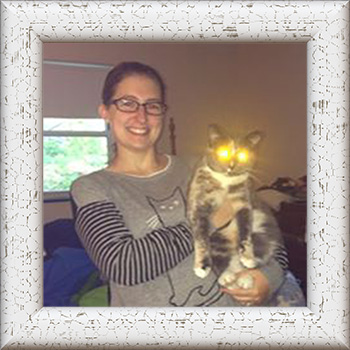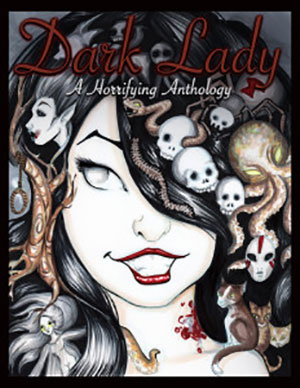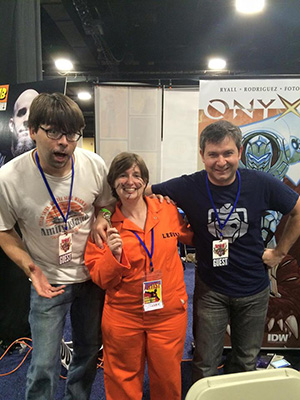It’s a cold winter evening in suburban Melbourne, Australia, but here to take my mind off the weather, and to talk about her book, is author Lindsay Moore. Thank you, Lindsay, for taking the time to chat to me. Please sit down, get comfortable and let’s begin.
About Lindsay Moore
Lindsay Moore co-founded Hellcat Press in 2014 with the goal of producing an all-female horror comics anthology. Having completed that goal with “Dark Lady”, she has decided to produce more horror comics anthologies. She is currently assembling a second anthology, “Simply Sinful”, which is co-ed.


What book are you here to talk about today?
Dark Lady
Tell us a bit about Dark Lady
“Dark Lady” is an all-female horror comics anthology. It contains ten short, scary stories written and illustrated by women from different parts of the world. The stories range from darkly amusing to downright gross. “Dark Lady” shows us the dangers of talking to animals, the lengths some women will go to in order to please others, and what happens when a nasty little hobby starts to get out of hand.
Where do your ideas come from?
I know it sounds cliche, but I try to get my ideas from whatever’s around me. I’m often inspired by current, newsworthy events, but I also find inspiration in little things, like conversations or people I’ve met. I’m kind of obsessed with horror, and often times I’ll wonder, “What would happen if [insert catastrophic event here] took place?” Or I’ll see a random, everyday object and wonder if it would be possible to write a scary story around it.
What do you consider to be your best accomplishment?
Publishing “Dark Lady” was definitely my best accomplishment. I was met with an incredibly negative reaction when I first pitched the idea to the Boston Comics Roundtable. I started my pitch with, “I want to create an all-female horror comics anthology because horror is a very male-dominated genre and women are often overlooked.” And I was immediately interrupted by this one guy shouting the words, “MARY SHELLEY!” over and over again. It was as if he expected me to say, “Oh, that’s right, a woman did a famous thing over a hundred years ago, I’m just being silly.” I looked over at the guy who was supposed to be moderating the meeting, as it was his job to make sure that no one was interrupted or anything like that. But he didn’t do anything. In fact, when I was finally able to finish my pitch, he raised his hand and asked, “Yeah, but what if I collaborate with a woman?” The whole thing went downhill from there. None of the women in the room asked any questions. The only people asking questions were men, and they were just mocking me. “What if I write about a female character? What if I just don’t tell you I’m a man? Are you going to require proof of gender?” It was so disheartening and upsetting to hear people who I had always thought of as friends tear my idea apart because they didn’t think that an all-female anthology was worth their time.
Despite all the negativity from the Boston Comics Roundtable, I still got submissions for “Dark Lady” and still published it. It’s selling very well online and at conventions, and it’s gotten positive reviews from several sites that review comics. “Dark Lady” is my greatest triumph to date.
Have you always liked to write?
Yes. I’ve always loved writing. I’ve been writing little stories ever since I could hold a pencil … they’ve just gotten darker over the years.
What writing advice do you have for aspiring authors?
Keep a diary or journal. It doesn’t need to be formal or anything like that. Just write whatever you feel in it. Doodle in it. Cover it with stickers. Get in the habit of writing every day, even if all you write down is a grocery list. And read a lot. Read whatever you can get your hands on. Step out of your comfort zone every now and again and pick up a book from a genre that you don’t normally like or wouldn’t think of reading.
If you didn’t like writing books, or weren’t any good at it, what would you like to do for a living?
That’s a tough one. Data entry? Shepherd? Person who raises cats? I have no idea.
Do you read reviews of your book(s)? Do you respond to them, good or bad? How do you deal with the bad?
I read reviews of my book. There aren’t a lot of them, and they’ve been mostly positive. I have encountered some negativity, but I just brushed it off and said, “Well, that’s something to consider fixing/doing different next time.” I don’t respond to reviews because I don’t really have the time.
What is your best marketing tip?
Finish your product before you start marketing it. I worked briefly on a group project with one member who was continually advertising for a graphic novel that we simply didn’t have. He was reaching out to various celebrities and trying to get them to endorse the book or be a part of it. I begged him not to because we didn’t even have a script. The thing wound up tanking because he kept schilling a product that didn’t exist yet. So, finish the damn thing before you start advertising it.
What is your least favourite part of the writing / publishing process?
Marketing. When you self-publish, you have to do all the marketing yourself. Advertising for “Dark Lady” really taught me that I had to be proactive. I couldn’t just sit by and wait for someone to notice the project. I had to reach out and say, “Hi! My name’s Lindsay and this is my project, and this is why it’s fun and exciting!” It’s exhausting, but very rewarding knowing that people are paying attention.
Do you have a favourite conference / convention that you like to attend? What is it?
I’m a fan of Boston Comic Con. I’ve been going for almost ten years now, and I love it. I take empty cigar boxes and decoupage them with comic books, then I sell them at Boston Comic Con. That’s actually how I financed “Dark Lady”. And I also met Joe Hill (that was pretty awesome).
I also love the Maine Comic Arts Festival (MECAF). It’s a fun little show in Portland, ME, that focuses exclusively on indie comic creators. They’ve had some great guests in the past (Kate Beaton and Jeff Smith). It’s a kid-friendly show, and I love seeing kids pick up new and interesting comics that they’d never find in a regular comic book shop.

Is there a certain type of scene that’s harder for you to write than others?
I have trouble with writing violence because I tend to go overboard with it. I find that I need to write violent scenes in stages. At stage one, I don’t hold anything back; I go whole-hog, splatterpunk-style. I put the piece down for a while, then at stage two, I go through and clean up the scene. I scale back the violence like I’m peeling away layers. The first draft was a sledgehammer, the final draft winds up being an ice pick.
How long does it usually take you to write the first draft of a book?
I’m currently working on a graphic novel about a superhero who winds up in debt to the mob. The first draft took one month, but the circumstance was kinda weird. I had a fatty lipoma in my shoulder — completely harmless — and my doctor said that it could be removed very quickly and easily. “We’ll set up an appointment for you for when I get back from vacation,” he said. Then he went on vacation for a month. I had an entire month to contemplate surgery, and I wrote as a way to distract myself. I essentially puked out the first draft.
Can you give us a few tasty morsels from your work-in-progress?
I’m only in the scripting phase right now. I don’t have an artist lined up of anything. So, unfortunately, I don’t have a preview for you.
How has your environment or upbringing impacted your writing?
When I was little, my parents would see me writing a story and call me their “little Stephen King.” I started reading King when I was twelve or thirteen, and basically started imitating him. At some point, I realized that I needed to have my own writing style, not someone else’s. I had to work very hard to unlearn my borrowed writing style and find my own voice.
Why should a potential reader buy your book(s)?
“Dark Lady” is a must-have for any horror fan — especially any horror comics fan. It features ten unique stories guaranteed to disturb, unsettle, frighten, and — above all — entertain. To my knowledge, it’s the only all-female horror comics anthology out there.
What’s the strangest thing you have ever had to research for your book?
I’m currently researching Russian mafia tattoos.
Why did you choose to write in your genre? If you write in more than one, how do you balance them?
I just like horror. I’m drawn to the macabre and the unsettling. Horror’s an interesting genre because hip new ideas become cliche almost instantly, and it’s forced to change constantly. After “The Sixth Sense” came out, everyone flipped out over the twist ending. They loved it. If you try for that same twist ending today, people will say it’s cliche and tired. Horror creators have to stay on their toes.
Where did your love of books come from?
Probably my mother. She would take me and my siblings to the library every week to pick out books to read before bed. She realized what kind of books we liked and had the librarian help us find them.
What would the main character in your book have to say about you?
“Please stop tormenting me.”
Are your characters based on real people, are they imaginary or a combination of both?
It’s a combination. Growing up, I had friends who would ask me to write a character based on them into a story. I never liked doing that; it felt like I didn’t have any control over that character. I’ve had people accuse me of writing about them, which is never fun.
When you’re writing, do you listen to music or do you need silence?
I need classic rock while I write.
Who are your favourite authors, and why?
I’ll always have a soft spot in my heart for Stephen King. I recently reread “‘Salem’s Lot” and remembered how much it scared me when I was twelve (and how much it still scares me). I’m also a huge fan of Joe Hill; I especially love “Locke and Key.”
I recently discovered Eugie Foster. She wrote a lot of short horror/sci-fi/fantasy stories with a distinctly Japanese flair. Her writing is poetic and haunting, even when something gross is happening in the story. I strongly recommend “Biba Jibun,” “Returning My Sister’s Face,” and “When It Ends, He Catches Her.”
Where can readers go to discover more about you and your books?
Website | Facebook | Twitter
Available formats: paperback
17



Be the first to comment!